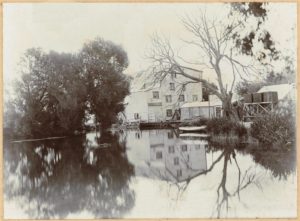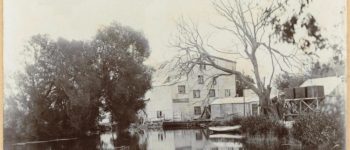1914: The Light of Brightwater
April 20, 2020
By AHNZ
Brightwater, Nelson, as well as being the birthplace of Rutherford was also the home of the region’s first electricity plant. Initially named Spring Grove, the settlement instead came to be named after the local mill: Brightwater.
The local singing miller would strike up a particular tune¹ as he worked, inspired by the clear waters that powered his mill.
“Bright water, bright water, bright water for me”
The flax mill, like so many others, became a flour mill later on in history but after that it still had one more product to mill: electricity. There was enough surplus power to generate some joules to power the street lights of Brightwater and, later, nearby Richmond as well. By this time in history the town of Reefton had been powered up since 1884 but only Gore (1894) had followed suit with a hydro-electric station too. With the bureaucratic red tape that had to be negotiated is it any wonder that it took Brightwater until 1914 to be only the third settlement on the hydro-electric history timeline?
Bureaucratic Red Tape
July 1911: Central Government requested permission for Brightwater electricity plant
8 September 1911: “A deputation from the Brightwater Progressive Association..The Chairman said that the Council would be only too pleased to help forward the district; but it could do nothing till a reply had been received from the Government as to the rights involved. The Council had written two months ago but had not yet received a reply.”- Nelson Evening Mail
23 May 1912: A “meeting of ratepayers was held in the Council Chambers to discuss with Mr. Ellis, of Brightwater, a proposal to light the borough with electricity…” Mr. Ellis “…stated that as yet the Waimea County Council had not granted permission.”- Colonist
8 March 1912: “From the Public Works Department in reference to the Council’s application of 10th July last for an Order-in-Council ..Minister was not aware of any authority vested in a county council to establish any scheme of electrical lighting…”
“The Minister pointed out that.if a license was granted to Mr Ellis it must be a license both under section 5 of the Public Works Amendment Act, 1908, and under section 2 of….The Crown law officers did not agree with the opinion expressed by Messrs Fell and Atkinson that Mr. Ellis was entitled to use water for electric lighting without a license. “- Colonist
7 February 1913: “Mr. H. Atmore, M.P., who has been making representation to the Public Works Department on behalf of Mr. Robert Ellis, of Brightwater, in regard to the delay in the issuing of a license to enable him to provide electricity for lighting Richmond and Brightwater,received a telegram from the Minister yesterday stating that a draft license was being sent to Mr. Ellis for his consideration.”- Colonist
27 February 1913: “Richmond Borough will shortly be installed with electric light. It will be remembered that from time to time information has appeared in these columns detailing the efforts of Mr Ellis, of Brightwater Flour Mills, to obtain the necessary license from the Government enabling him to use the water-power now going to waste at his mills to generate electricity for transmission within a radius of six miles, and particularly to Richmond. After repeated delay, Mr Ellis has at last received a draft license, which will enable him to proceed with the preliminary work immediately. A contract for the supply of dynamos, switchboards; cable wire, etc., has been let to Messrs Niven and Co-., of Napier. The plant is promised by the end of May, and should b° in working order in June….”- Nelson Evening Mail
4 July 1913: “It is expected that tho township of Brightwater will be lighted by electricity next month. The poles and wires are now in position, and Mr. Ellis is only waiting for the arrival of some plant from England.”- Colonist
10 September 1913: “The utility of electricity for domestic and other purposes is well demonstrated at the residence of Mr Ellis, of Brightwater Flour Mills. From a 5 h.p. dynamo, driven by water-power, Mr Ellis has made provision for lighting, cooking and heating. The power is also used in connection with an electric piano, and all, that is necessary to produce music is to “touch a button and the piano, does the rest.” To watch the keys of the instrument moving from no apparent cause is quite uncanny at first, but the excellent music obtained soon dispels this feeling.”- Nelson Evening Mail
6 February 1914: “Mr R. Ellis of Brightwater, advised the Waimea County Council yesterday that his plant for lighting Brightwater and Richmond by electricity was now ready. The Council authorised Mr Ellis to proceed with the lighting of the council’s street lamps forthwith”- Colonist
The Chicken Dependent Resistor
 Thus, after some 3 years of insane wrangling with The State electricity was permitted at last to flow. No wonder so few other towns had electric power with such dithering from Central Government. It was a time where many rights we take for granted today, like holding a bazaar or raffle, required special State permission.
Thus, after some 3 years of insane wrangling with The State electricity was permitted at last to flow. No wonder so few other towns had electric power with such dithering from Central Government. It was a time where many rights we take for granted today, like holding a bazaar or raffle, required special State permission.
“the five street lights, along with ten in the neighbouring town of Richmond, were switched on and off each day by an ingenious device linked to a… chicken perch! “
The final interesting bit to this old Brightwater and Richmond electrical circuit is the inclusion of the chicken. Before the Light Dependent Resistor (LDR) there was…the Chicken Dependent Resistor (CDR.) According to the old Kaimira Wines history page, the Street Lights of Brightwater and Richmond actually relied upon a CDR as part of their electrical circuit. I’m sure they found the hens a far more dependable way to get power flowing than the State had been!
—
1 Kaimira Wines; Wayback Machine
Ref. NZH&NH; Heritage NZ; Facebook; Phil Braithwaite; PhilBee NZ, Flickr
Image ref. Brightwater Mill; Tasman District Libraries Kete
Ref. Papers Past
 Like Comment Share
Like Comment Share






